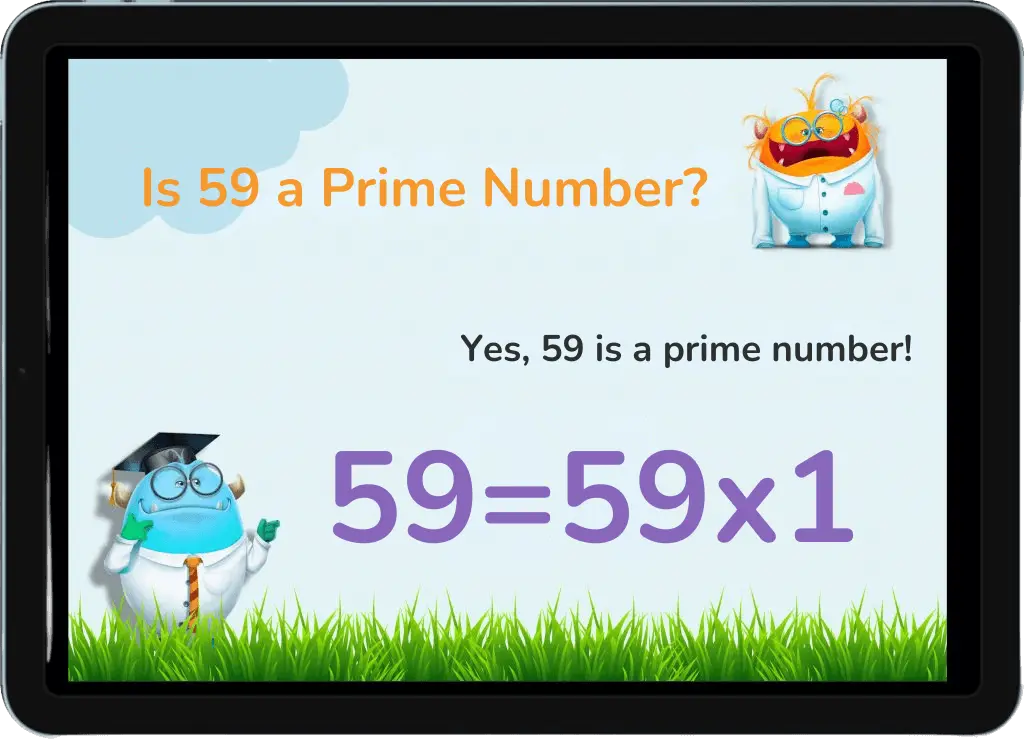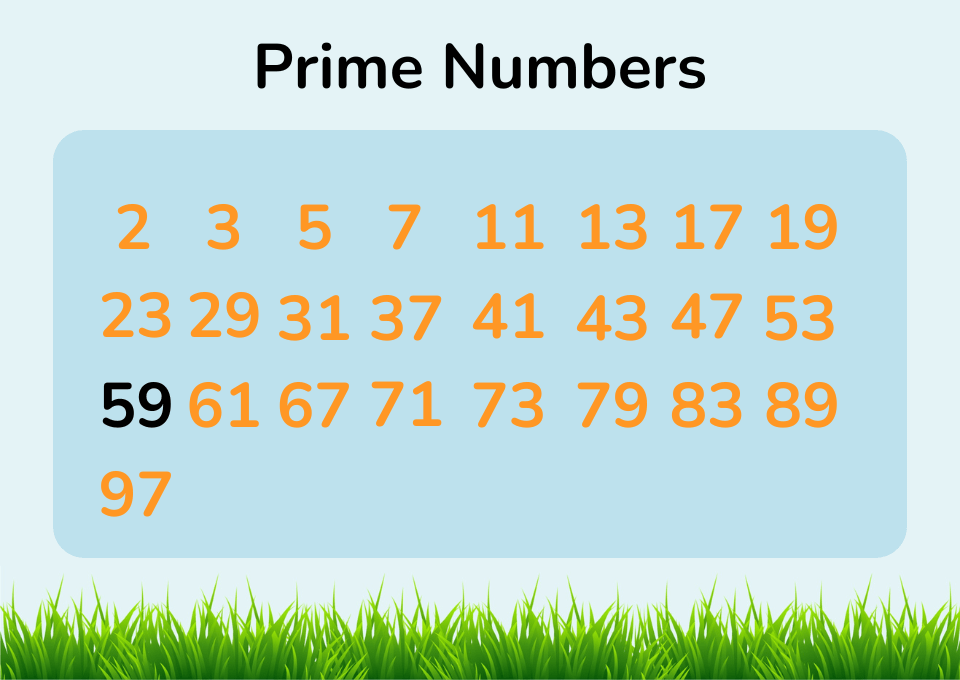Is 2 A Prime Number?
Prime vs. Composite Numbers
Greetings, young math enthusiasts! Today, let’s set sail on a mathematical voyage to determine if 2 is a prime number, and learn more about the difference between prime and composite numbers.

Is 59 a Prime Number?
Or Is 59 a Composite Number?
Math can be as thrilling and fun all at once! We know, the numbers may be scary at times but they hold so much power. Fasten your belts as we dive into the adventure of finding out if 59 is a prime number!


No credit card required

No credit card required
What are Prime Numbers?
Is 59 a Prime Number?
How is 59 a Prime Number?
Is 59 a Composite Number?
What Makes Number 59 Unique?
Is 59 a Twin Prime?
Mathematical Properties of Number 59
Is 59 a Composite Number?
What are Prime Numbers?
A prime number can only be divided evenly by 1 and itself. Think of prime numbers as the VIPs of the number world; only 1 and the number itself get special access. Examples include 2, 3, 5, 7, and 11. They don’t like sharing the stage with other numbers.
Prime numbers are the building blocks of the math universe, just like atoms in chemistry. From a few types of atoms, countless molecules are made; similarly, any number can be constructed using prime numbers!
Is 59 a Prime Number?

Yes, 59 is definitely a prime number. It falls into the category of natural numbers greater than 1 that have exactly two factors: 1 and 59 itself.
How is 59 a Prime Number?
Let’s explore what makes 59 a prime number. Think of prime numbers as the elite members of the number world, each with its own distinct properties. For 59, its uniqueness is in the fact that it can only be divided evenly by 1 and 59.
Prime Factorization of Number 59
Prime factorization breaks down a number into its simplest building blocks. Since 59 is a prime number, its factorization is straightforward:
59 = 59 x 1
This indicates that 59 cannot be divided further into other prime numbers.
Factors of Number 59
Factors are the numbers you multiply together to get another number. For 59, the factors are:
- 1
- 59
This pair of factors is what makes 59 a prime number.
Is 59 a Composite Number?
No, 59 is not a composite number. Composite numbers have more than two factors, meaning they can be divided evenly by numbers other than just 1 and themselves.
Example of a Composite Number
Consider 60, which is a composite number because it has multiple factors:
- 1
- 2
- 3
- 4
- 5
- 6
- 10
- 12
- 15
- 20
- 30
- 60
Unlike 59, 60 can be divided by many different numbers, making it composite.
What Makes Number 59 Unique?
The number 59 is special for various reasons, appearing in interesting contexts beyond its prime status.
Everyday Life and Universe
In everyday life, the number 59 might not be as commonly highlighted as other numbers, but it does show up in unique places. For example, Interstate 59 is a major highway in the United States running from Louisiana to Georgia, covering significant travel routes. Only 59% of the moon’s surface is visible from Earth! The largest fish ever recorded was a Whale Shark, stretching an impressive 59 feet in length, found off the coast of Thailand.
Games
In games and puzzles, prime numbers like 59 often play a role in creating complexity and ensuring randomness. In some board games and card games, understanding prime numbers can give players a strategic advantage.
Is 59 a Twin Prime?
Yes, 59 is a twin prime. Twin primes are pairs of prime numbers that differ by exactly two. Examples include (11, 13), (17, 19), and (59, 61). Since 59 and 61 are both prime numbers and they differ by two, they form a twin prime pair.
Mathematical Properties of Number 59
Number 59 also has a significant place in various mathematical theories and applications.
Mathematics
The number 59 holds some interesting mathematical properties. It is the second irregular prime, meaning it does not fit into the expected regular pattern of prime numbers. Additionally, 59 is the third Pillai prime. This is because 15! + 1 is divisible by 59, but 59 is not one more than a multiple of 15. Furthermore, 59 is the fourth Eisenstein prime with no imaginary part, and its real part can be expressed in the form 3n − 1, where n is an integer. These unique properties highlight 59’s special place in number theory.
Signal Processing
In signal processing, prime numbers such as 59 can be used in designing digital filters. These filters are crucial for reducing noise and improving the clarity of signals, as primes help avoid certain types of interference.
Cybersecurity
Prime numbers are fundamental in encryption algorithms used to protect data. The RSA encryption algorithm, for example, relies on the complexity of factoring large prime numbers like 59, making it an essential component in cybersecurity.
Is 59 a Composite Number?
No, 59 is not a composite number. It is a prime number because it has exactly two distinct factors: 1 and 59. Composite numbers have more than two factors, meaning they can be divided evenly by numbers other than just 1 and themselves. Since 59 can only be divided evenly by 1 and itself, it is classified as a prime number.
Learn More About Prime Numbers
© 2024 Smartick. All Rights Reserved.
